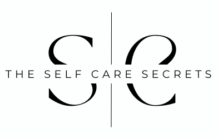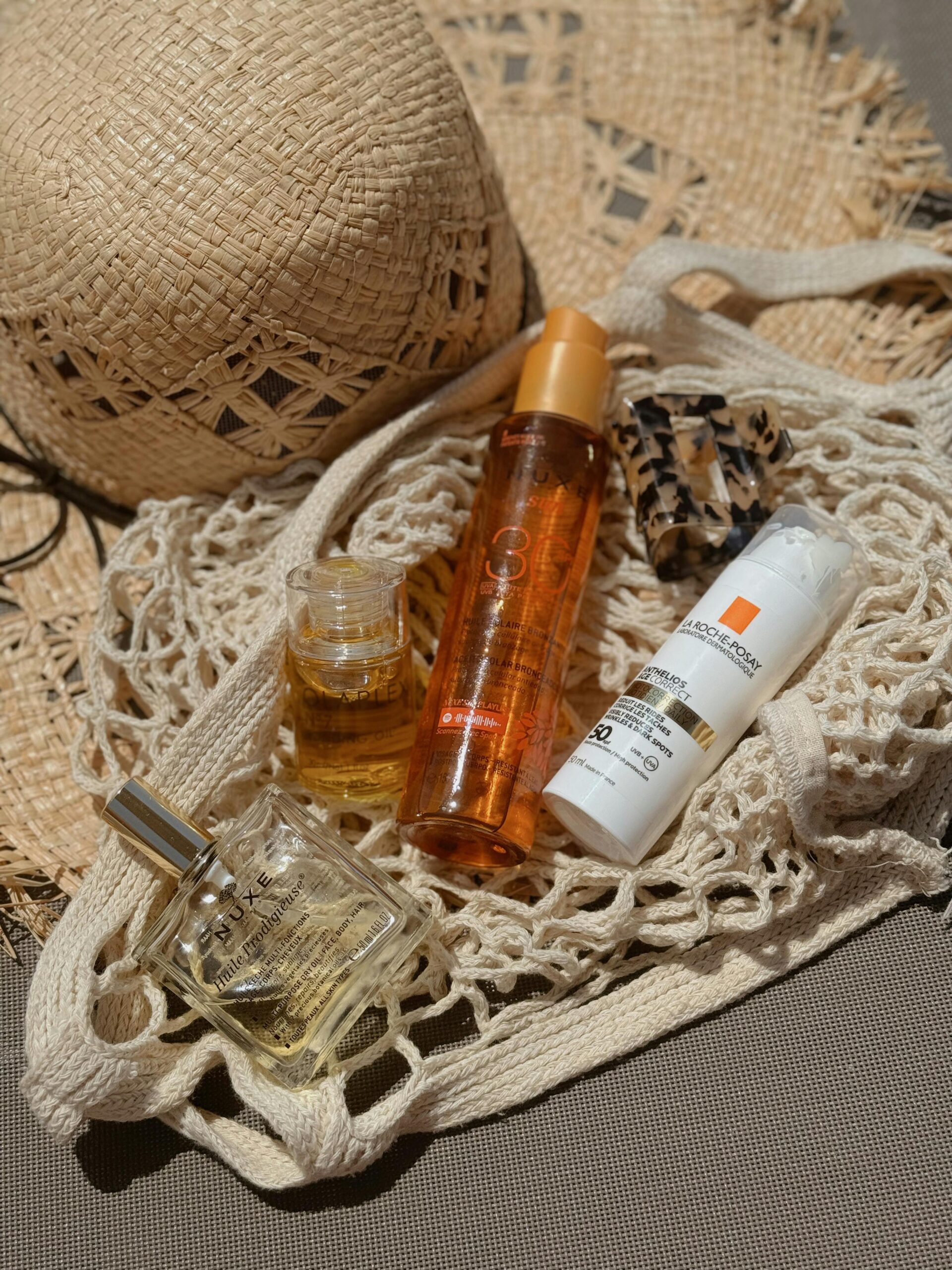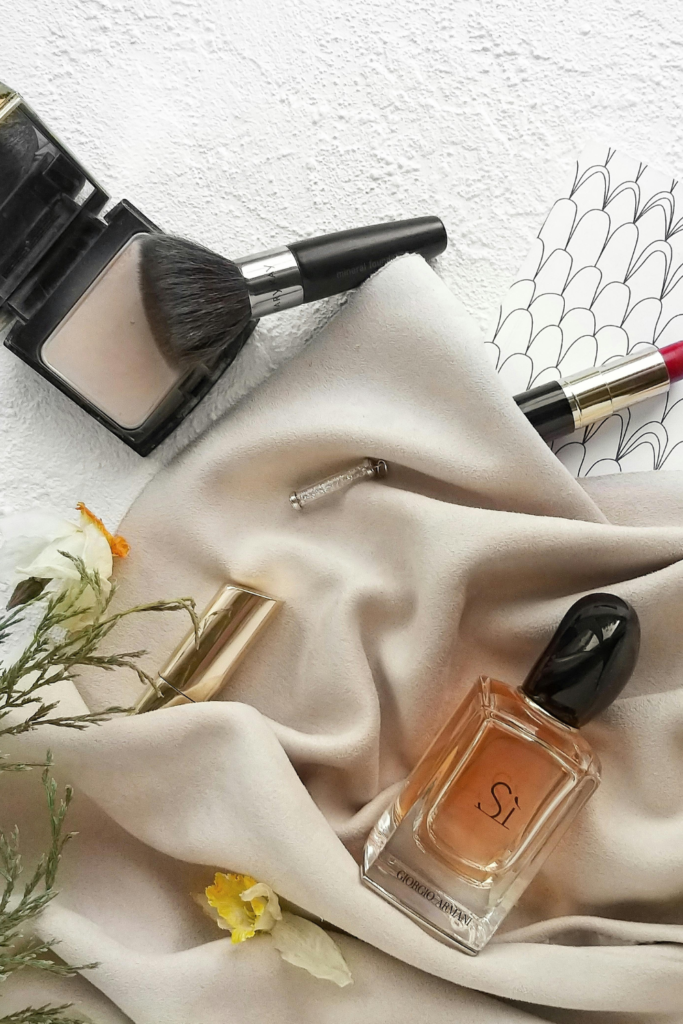If you’ve got acne-prone skin, finding a sunscreen that doesn’t lead to more breakouts can feel overwhelming. You need something that protects your skin but doesn’t clog your pores or cause irritation. So, what’s the better choice—mineral or chemical sunscreen? Let’s break it down to help you make the right decision.
Why Sunscreen Matters
First off, sunscreen is absolutely essential, especially for acne-prone skin. Sun exposure can make acne scars darker, worsen hyperpigmentation, and speed up the signs of aging—not to mention increase your risk of skin cancer. But here’s the challenge: you need a sunscreen that shields your skin from UV damage without adding to your skin troubles. To choose wisely, it helps to understand the difference between mineral and chemical sunscreens.
Mineral vs. Chemical Sunscreen: What’s the Difference?
Mineral Sunscreen (Physical Sunscreen)
Mineral sunscreens contain ingredients like zinc oxide or titanium dioxide. These form a physical shield on your skin that reflects UV rays away. Since mineral sunscreens mostly stay on the surface rather than absorbing into the skin, they’re less likely to block your pores. That’s why they’re often recommended for acne-prone skin.
Chemical Sunscreen
Chemical sunscreens work a bit differently. They absorb UV rays, convert them into heat, and release that heat from your skin. These sunscreens tend to feel lighter and spread more easily, but they can sometimes irritate acne-prone skin because of the chemicals involved.
Incorporating Sunscreen Into Your Routine
The application of sunscreen is as crucial as selecting the right product. Your skincare regimen extends beyond just cleansing and moisturising; shielding your skin from the sun’s harmful UV rays is equally vital. Regardless of whether you prefer a simple routine with only a handful of products or indulge in an intricate 10-step process, incorporating sunscreen is essential. But where does it fit into your routine?
Mineral Sunscreen
You’ll want to apply mineral sunscreen as the last step in your skincare routine. Since it sits on top of your skin, it acts as a protective barrier against the sun.
Chemical Sunscreen
Chemical sunscreens can either go on before your moisturiser or after, either way they need time to absorb before applying any other products on top .This allows them to sink into your skin and do their job effectively. They work well under makeup, but if your skin is easily irritated, you might want to proceed with caution.
Why Is Sunscreen Such a Big Deal in Your Routine?
Sunscreen isn’t just a sidekick to the rest of your skincare products—it’s the hero and shouldn’t only come out in the summer time(guilty!). Skipping it can undo all the good your serums, moisturisers, and treatments are doing. Here’s why:

- Prevents Sunburn and Skin Cancer: Sunscreen protects your skin from harmful UV rays that can cause sunburn and increase your risk of skin cancer.
- Fights Aging: Too much sun exposure speeds up the aging process, leading to wrinkles, fine lines, and dark spots. Sunscreen helps keep your skin looking youthful.
- Boosts the Effects of Other Skincare Products: Powerful ingredients like retinoids and vitamin C can make your skin more sensitive to the sun, so sunscreen helps keep your skin safe while letting those products work their magic.
Don’t Forget: Where Should You Apply Sunscreen?
It’s easy to remember sunscreen for your face, but what about the other areas that are exposed to the sun? Commonly missed spots include your neck, chest, ears, and the backs of your hands. These areas are just as vulnerable to sun damage, so make sure to cover them up, too. Basically, if the sun can reach it, sunscreen should be on it.
Don’t get me wrong though- sun exposure has incredible health benefits, but I’m referring to excessive time spent in the sun. Your choice to wear sunscreen may depend more on aesthetic reasons than anything else and thats what i’m writing about.
FAQs: Mineral vs. Chemical Sunscreen
Q: Which sunscreen is better for sensitive skin?
A: Mineral sunscreens are usually the go-to for sensitive skin. The ingredients, like zinc oxide and titanium dioxide, are less likely to irritate your skin since they don’t absorb into it.
Q: Are chemical sunscreens harmful to the environment?
A: Some ingredients in chemical sunscreens, like oxybenzone, have been linked to coral reef damage. If that’s a concern for you, look for sunscreens labeled “reef-safe” or stick to mineral options.
Q: Can I reapply sunscreen over makeup?
A: Definitely! There are some great mineral sunscreen powders and chemical sunscreen setting sprays that work perfectly for reapplying over makeup without messing up your look.
Best sunscreens for reapplication
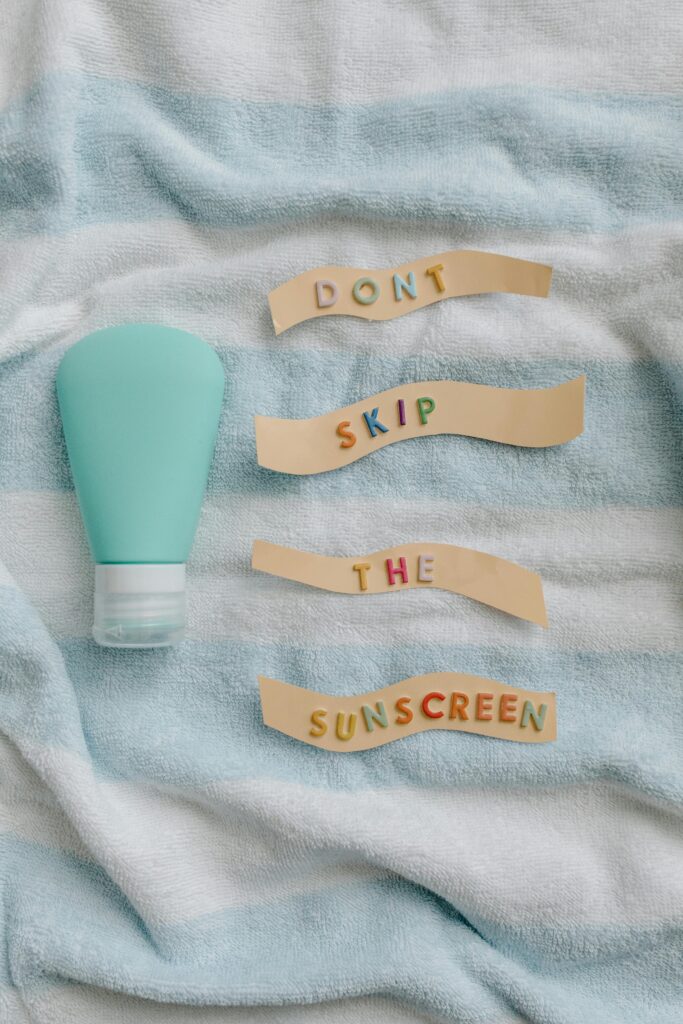
Here are the best options I recommend:
Mists:
- – Naked Sundays Glow Mist SPF 50: (no white cast or stickiness, includes hyaluronic acid for hydration and sets makeup!)
- – Biore UV aqua rich protectSPF 50 (offers hydrating ingredients like squalene and dimethicone and layers amazing over makeup)
- – La roche posay anthelios SPF 50 :(Lightweight , non greasy, great for oily skin and no white cast)
Powders:
- -Supergoop! (Re)setting 100% Mineral Powder SPF30 (Great for sensitive skin and oily skin as it is a powder and mineral sunscreen)
- Colorescience Sunforgettable Total Protection Brush On Shield Glow SPF 50
Sunsticks:
Shiseido Clear Suncare Stick SPF50+ ( Offers hydration without a greasy feel and leaves no white cast. It’s particularly suitable for drier and sensitive skin types due to its cooling ingredients. Additionally, its water-resistant formula makes it highly durable, making it an excellent choice for activities where you might be sweating.)
Mary & May Vegan Peptide Bakuchiol Sun Stick SPF50+ PA++++ (This is the best sunstick particularly for those looking for anti aging benefits as it has bakuchiol so it doubles up on targeting fine lines wrinkles and creating youthful looking skin)
Beauty of Joseon Matte sun stick : Mugwort+Camelia This is great for oily acne prone sensitiver skin due to its added ingredients like mugwort which helps calm the skin and reduce redness. it gives a matte finish so great for oily/ combo skin types.
Pros and Cons of Mineral vs. Chemical Sunscreens
To make things a bit clearer, here’s a quick rundown of the pros and cons of each type:
Mineral Sunscreen Pros:
- Great for sensitive skin—less likely to cause irritation.
- Works immediately—no waiting for it to activate.
- Safer for the environment, especially marine life.
Mineral Sunscreen Cons:
- Can leave a white cast, particularly on darker skin tones (though tinted versions help with this!).
- The texture can be thicker, which some people find heavy or greasy.
Chemical Sunscreen Pros:
- Lightweight and easy to blend into the skin—no white cast.
- Available in water-resistant options.
- Perfect for layering under makeup.
Chemical Sunscreen Cons:
- Takes about 15-20 minutes to activate after applying.
- Can sometimes cause irritation for sensitive skin types.
- Some ingredients may be harmful to coral reefs.
- Most chemical sunscreens include ingredients that are suspected endocrine disruptors thus could potentially be harmful to us.
Why Mineral Sunscreen Might Be the Better Option
When it comes to all skin types and not just acne prone skin, mineral sunscreens are usually the safer bet. Here’s why:
- Non-Comedogenic: They’re less likely to clog your pores.
- Soothing: Zinc oxide can actually help calm irritated skin.
- Lower Risk of Irritation: Since they don’t penetrate the skin as much, they’re gentler on sensitive or reactive skin.
- Environmentally friendly: They are reef safe
- Healthier option: Even-though you may believe chemical sunscreens are safe and harmless, its better to to as they are only suspected to be harmful due to few studies, personally i’d rather just be safer and use mineral sunscreen as its active ingredients titanium oxide and zinc oxide are recognised as safe and FDA approved.
Best Sunscreens for Acne-Prone Skin
Following extensive research and personal testing, I have compiled a list of the top sunscreens suitable for acne-prone skin. The selection of these products has been made with careful consideration and deliberation… so here we go!
Top Mineral Sunscreens
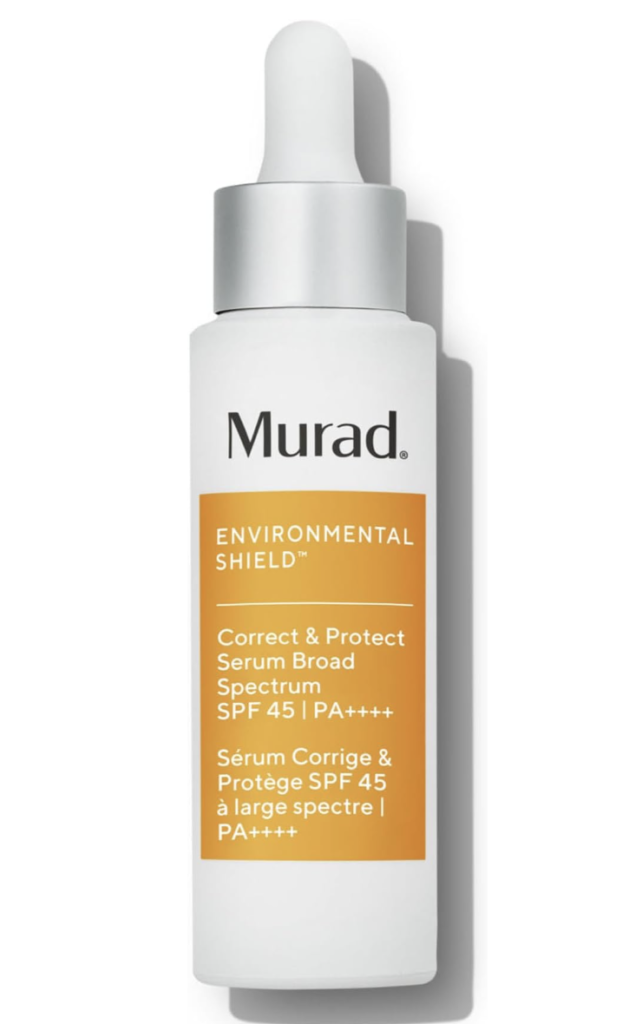
- Murad Correct & Protect Broad Spectrum SPF 45: Features an incredibly lightweight formula with a serum-like texture. It blends effortlessly, providing a radiant, dewy finish while leaving absolutely NO white cast behind. This sunscreen is ideal for deeper skin tones and will be appreciated by those with normal, combination, or drier skin types.
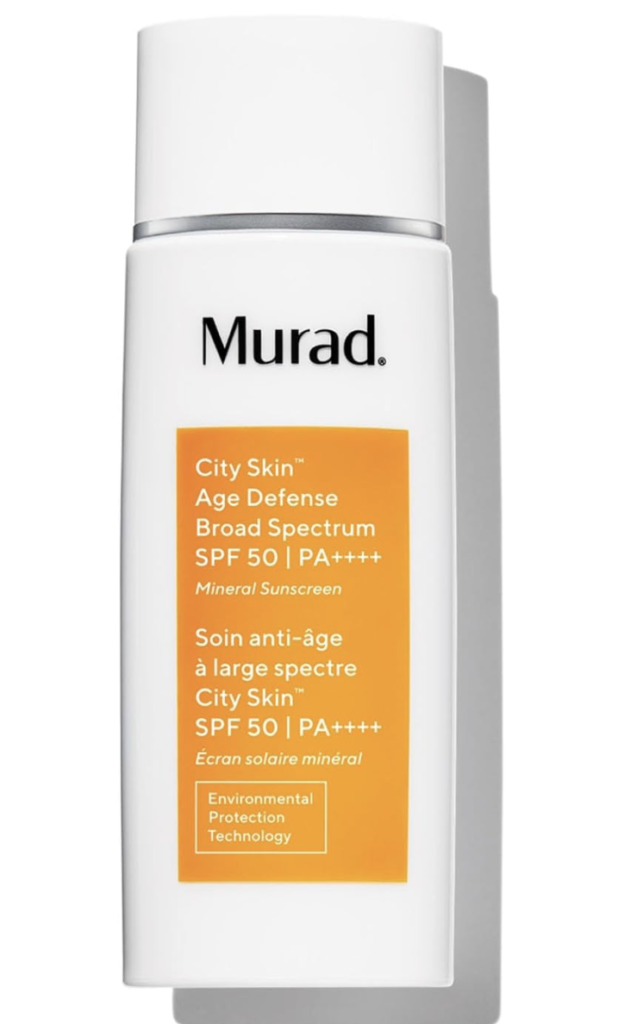
- Murad Environmental Shield City Skin Age Defense Broad Spectrum SPF 50 & : With a thin and creamy texture, it leaves a more matte finish to the skin, making it great option for oily skin types although its suitable for all. It also doesn’t leave a white cast making it inclusive for all skin tones.
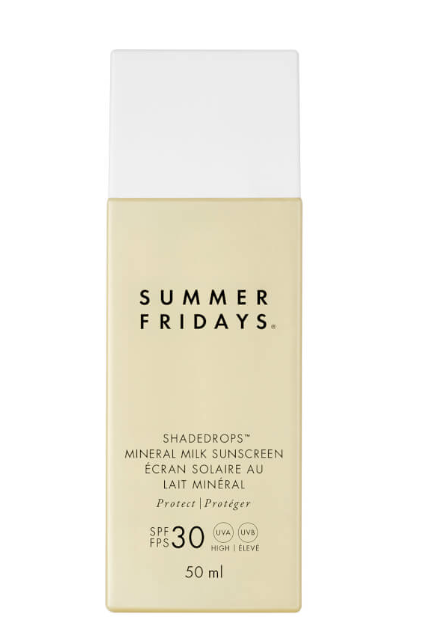
- SUMMER FRIDAYS ShadeDrops SPF 30 Mineral Milk Sunscreen: Features a milky consistency and a lightweight serum formulation that blends seamlessly with makeup. It provides a subtle glow to your complexion while enhancing hydration without any greasy residue, and it leaves no white cast behind. The formulation is packed with vitamins, antioxidants, and calming chamomile for added benefits.
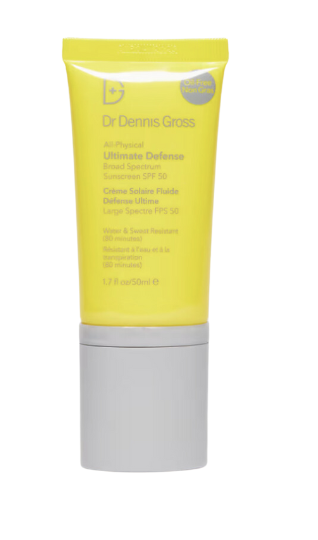
- Dr Dennis Gross All-Physical Ultimate Defense SPF50: Oil-free, fragrance-free, and alcohol-free formula that’s ideal for sensitive skin as well as individuals with eczema or rosacea. Its lightweight texture provides excellent hydration and sits beautifully under makeup. While it doesn’t leave a white cast (though some blending may be required), it’s an excellent choice for anyone seeking a dewy finish without any oily feel.
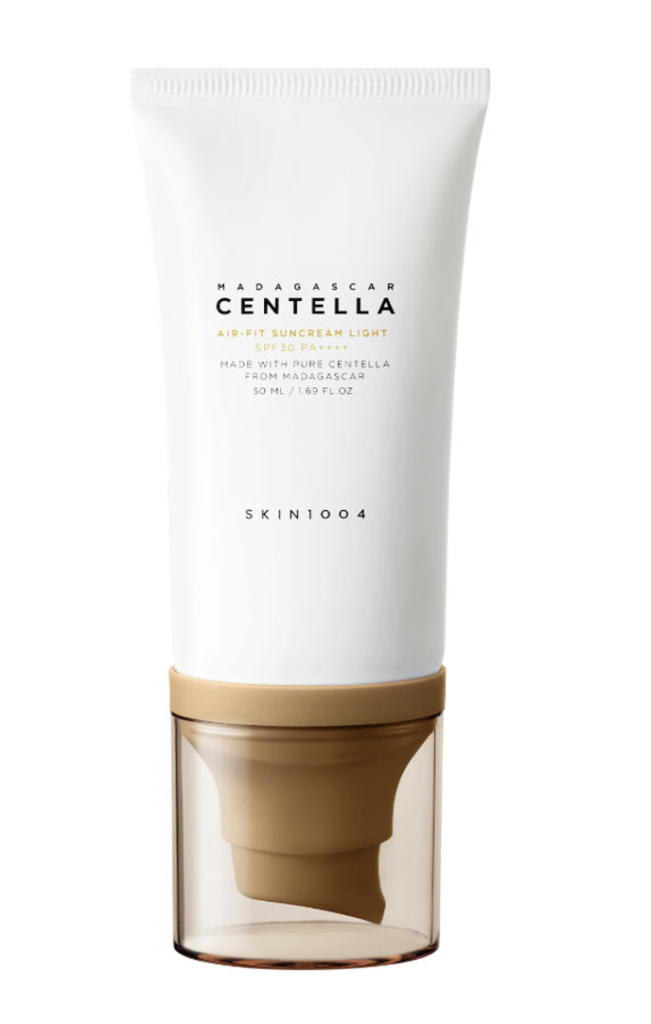
- SKIN1004 Madagascar Centella Air-Fit Suncream Light: The top budget-friendly mineral sunscreen for acne-prone skin. Its lightweight formula provides a subtle dewy finish without any greasy sensation. There’s no white cast, and it feels almost weightless once blended, making it an excellent choice for layering with makeup. This product works wonderfully for combination skin!
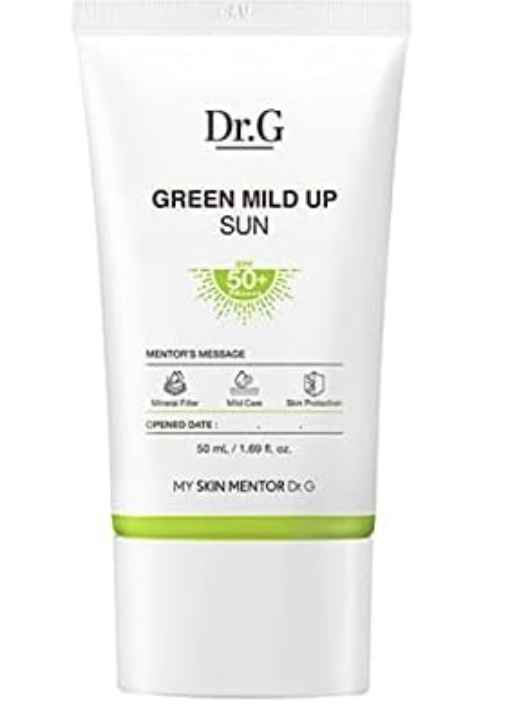
- Dr.G Green Mild Up Sun SPF50+ PA+++ Sun Screen Sun cream UVB Protector: Perfect for those with very oily skin seeking a completely matte finish. While it does leave a slight white cast, making it more suitable for lighter skin tones, it can still be effectively worn under makeup if you’re aiming for a truly matte sunscreen.
Top Chemical Sunscreens
All of these options are zero white-cast!
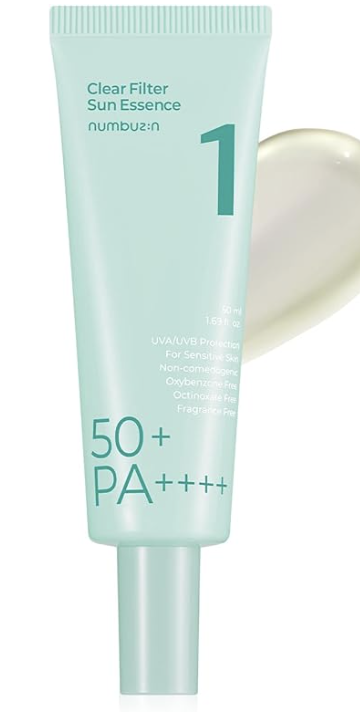
- numbuzin No.1 Clear Filter Sun Essence: With centella asiatica and heart-leaf formulated its super calming for the skin. It blends super easily and leaves a dewy finish and it drys down leaving the skin feeling hydrated but not oily . If you have a lot of redness this is great as it has a slight green tint to it.
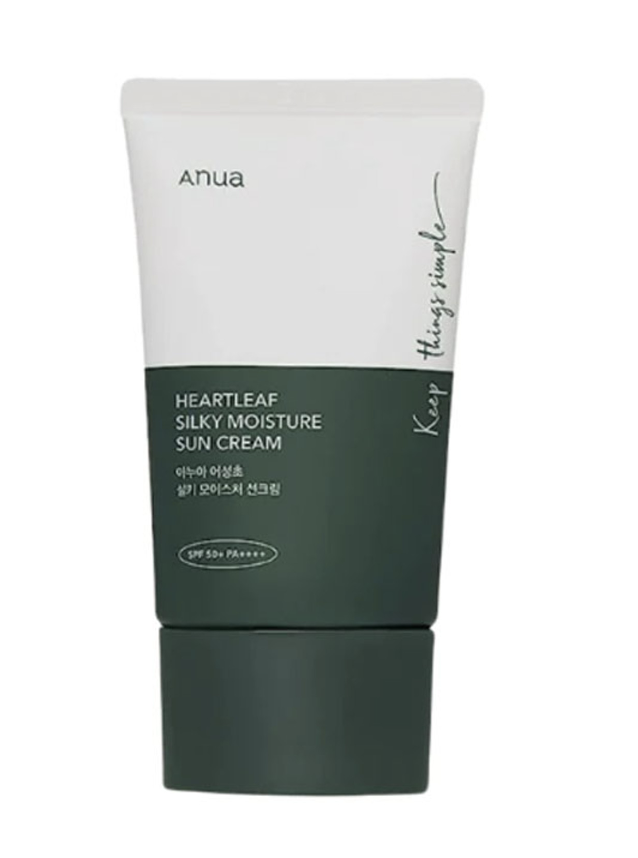
- Anua Heartleaf Silky Moisture Sun Cream: This sunscreen absorbs super quickly and has soothing ingredients like panthenol and heartleaf. It ability to controls oil production makes it a good option for oily/combo skin. It works really well under makeup and offers a natural finish .
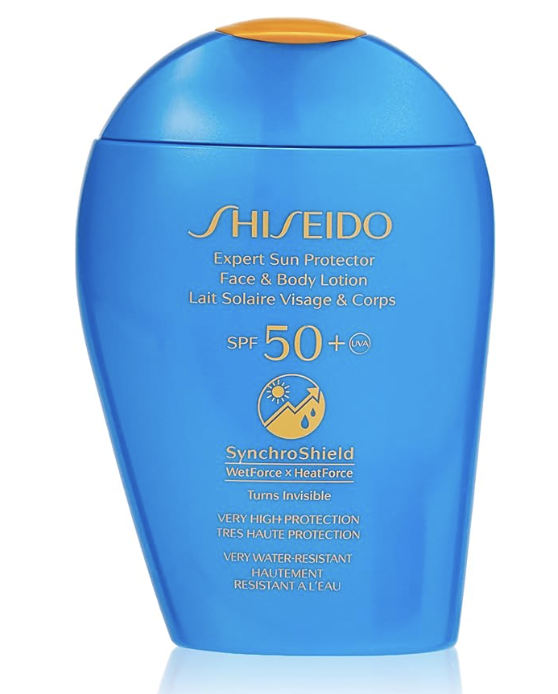
- Shiseido Expert Sun Protector Lotion with SPF50+ : This is a great option for if you are sweating a lot eg. when on holiday or doing sport activities as it super durable. It can be used for both the face and body but for the face it may be more suitable for drier skin types due its glowy finish. It also layers well under makeup.
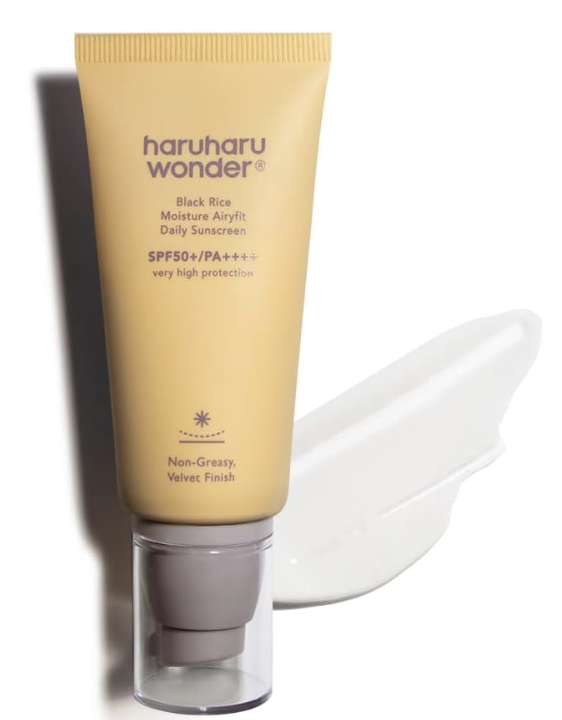
- Haruharu Wonder Black Rice Moisture Airyfit Daily Sunscreen – If you have oily skin or your looking for a sunscreen with a non-greasy velvet, semi-matte finish this is a great option. It also includes 5 modern chemical filters.
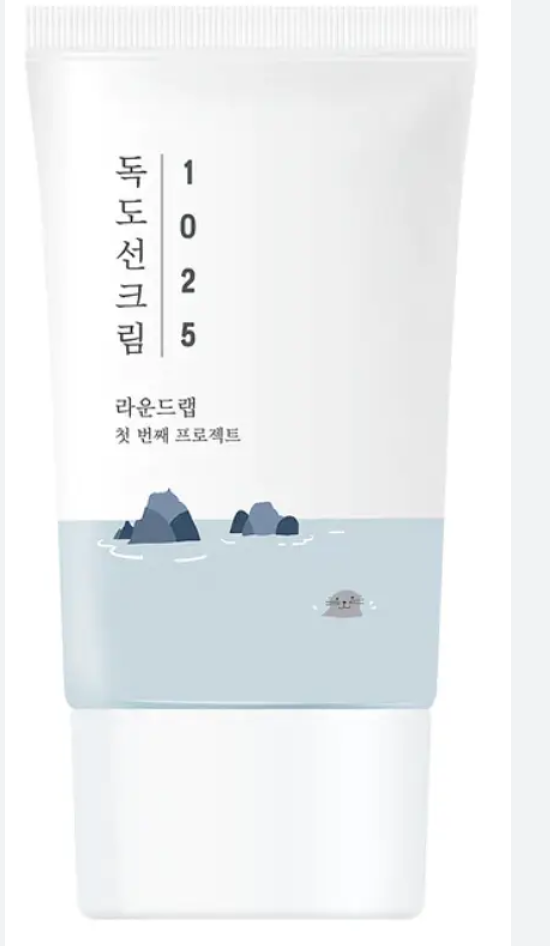
- ROUND LAB 1025 Dokdo Sunscreen SPF50+: This is again great for oily skin types as it dries downs super quickly and has a very lightweight feeling on the skin wihtout being greasy. It also includes 5 modern chemical filters.
The BEST mineral tinted sunscreens-
these definitely speak for themselves!
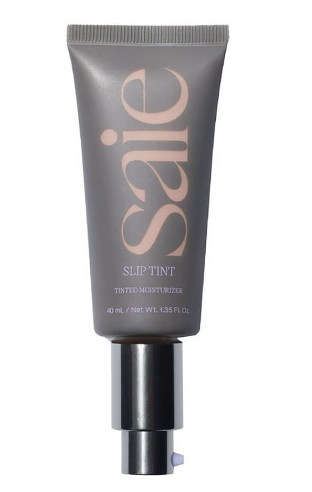
- Saie Slip Tint Dewy Tinted Moisturiser SPF 50 (this has gone viral for a reason)
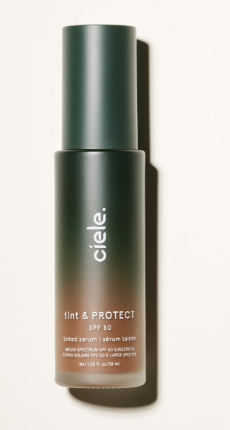
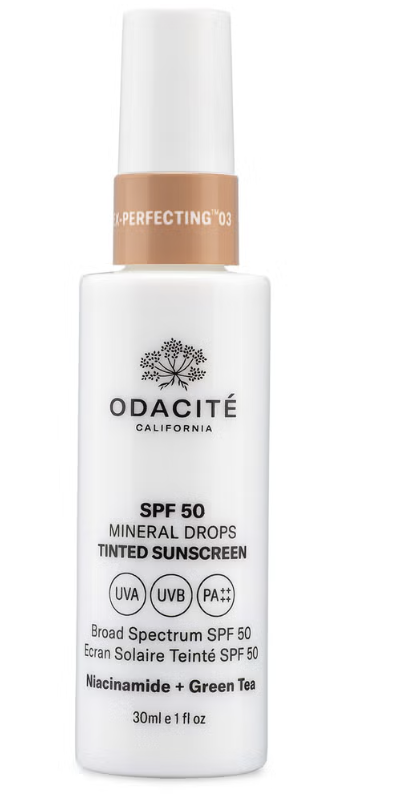
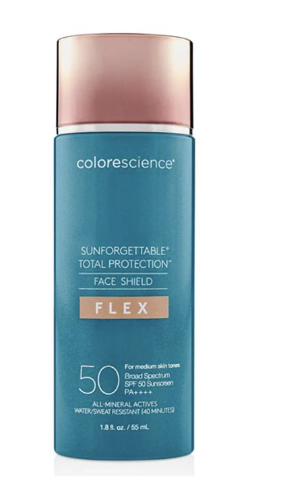
- Colorescience Total Protection Face Shield SPF 50 (Tiktok has shown us how good this one is)
Side Tip: Tinted sunscreens are deemed most optimal for protecting us against the suns UV rays due to the extra coverage the tint gives!
Final Thoughts: What’s Best for Your Skin?
When it comes to choosing the best sunscreen for your routine, it really comes down to a few things—your skin type, your lifestyle, and what you personally like.
- If you have sensitive or acne-prone skin, mineral sunscreen might be your best friend. If you prefer something that feels lightweight and invisible under makeup, chemical sunscreen could be more your style. and if being eco-friendly is a priority, mineral sunscreens are often considered more reef-safe.
But honestly, the most important thing is just making sure you’re using sunscreen every day—whether you’re indoors or outside. Make it a non-negotiable part of your morning routine. Trust me, your skin will be grateful, both now and years down the road!
I hope this post has given you some insight on the difference between mineral and chemical sunscreen and you can take away some knowledge or even some sunscreen 🙂
If you found this article useful, you may also like:
